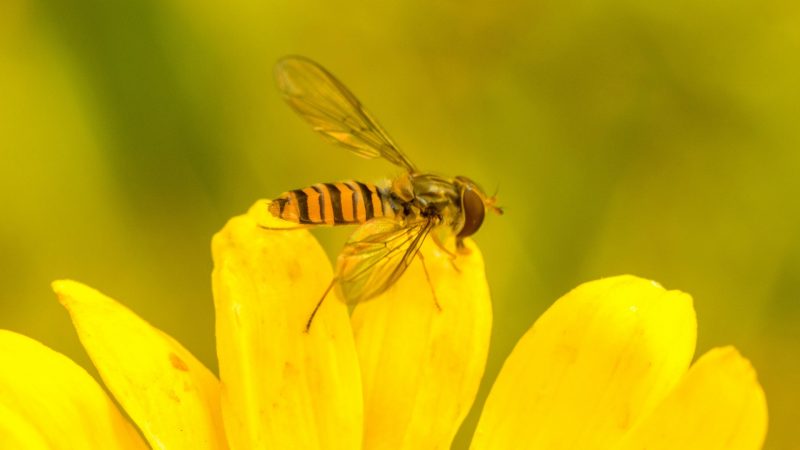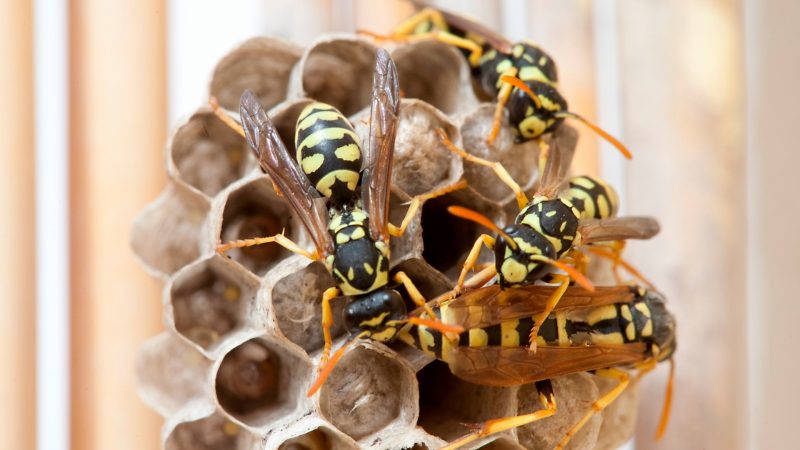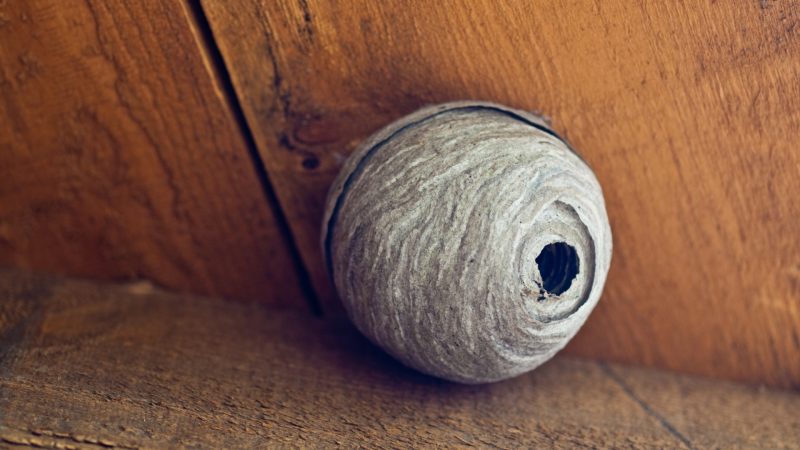There are approximately 30,000 identified wasp species, making them one of the most diverse insect families. Each has its own set of behaviors, activities, and life cycles. Sometimes, these even depend on the season.
So, when is wasp season exactly? Colony development starts in the spring, is completed throughout the summer, and ends in winter. Queen wasps will emerge in early April while first batch of eggs will hatch in late April to early May. The colony will continue to develop as the wasp queen’s population grows.
In this article, we’ll talk more about how these hardworking and dedicated wasps change their habits and behavior during different seasons, as well as their life cycle and much more.
How Long Does Wasp Season Last?

Wasp season can last up to 6 months, from spring to winter. When the weather is hot and sunny, wasps are most active. This is why they are so common in the summer. However, as it gets closer to winter and the temperature starts to drop, the presence of wasps becomes less visible since they can’t tolerate cold.
Wasp Life Cycle

Wasps go through a whole life cycle in the nest, from egg to larvae, pupa, and full-grown wasp. Worker wasps are the most common wasps that can be seen around. They are female wasps that never mate. However, the queen wasp has a different life span from worker wasps.
How Long Does a Wasp Live?
In general, worker wasps can live for up to 24 days. A wasp queen, on the other hand, can live up to 10 to 12 months. That’s the reason why at the start of their season, a wasp queen can be alive and ready to start a new colony.
When Do Wasps Die For the Season?
Worker wasps die over the winter, allowing the queen wasp to hibernate and live until spring, when she may begin a new colony. Wasps are weak with cold temperatures. That is why they are uncommon from December to February.
What Time of Year Are Wasps Most Aggressive?
As they get closer to winter, wasps become more aggressive from September to November. Wasps can’t tolerate being in the cold temperature. At the same time, wasps will have less food to collect, causing them to get more irritated.
As the temperature drops, they’ll become more protective of their hive and queen. They will also attack anything that they feel are threats to their nest. That’s why most wasps attack humans or other animals that come too close to their hive.
Where Do Wasps Go In the Winter?

Wasps hibernate throughout the winter months in deep cracks and crevices. During the winter, worker wasps will be in their hive and will die naturally. That is because of the cold temperature of winter, or either lack of nourishment, leaving only the wasp queen to hibernate and survive.
The main goal of worker wasps is to ensure that their queen is well-equipped to withstand the winter while hibernating. However, queen wasps will leave the hive to look for a suitable place to hibernate during the winter season.
The most common areas where queen wasps hibernate are cervices in woods and rocks. They are often found hibernating in roof cracks, garages, lofts, and attics.
When Is It Too Cold for Wasps?
Wasps are affected by cold temperatures in a variety of ways. Their metabolism will slow down when the temperature drops in the fall and moves closer to winter.
Wasps cannot live at temperatures below 50° F. They will be unable to move properly or even fly, making it difficult for them to be productive. At this time, wasps start to die.
What Month of the Year Wasps Nest?
Wasp nests from April to June. Around April, a queen wasp will emerge from hibernating through the winter season and will be on a mission to form a new colony. A queen wasp will look for a place to build a hive and lay eggs.
In a month or two, a wasp colony may be completed. Thus, most colonies are finished, and nesting is over by the beginning of summer. Wasps are busy outside their hive during the summer, looking for food and preparing for the upcoming winter.
How Long Does a Wasp Nest Last?
Wasp nests last somewhere from three to four months on average. Given that the queen wasps will remain, the nest will be able to live throughout the summer. That is, the hive is not disrupted or destroyed in any way.
Where Do Wasps Nest?
Wasps are capable to build nests almost anywhere. However, they prefer high-altitude and without predators. Wasp hives can usually be found in a variety of places, including wall cavities, roof spaces, beneath eaves, sheds, and tree branches.
Related: Hornet Nest vs. Wasp Nest | Similarities, Differences, and How to Get Rid of Them
Events and Behaviors of Wasps Throughout the Year
| Month | Wasps’ Activity |
| December-February | Wasps hibernate in deep cracks or crevasses throughout the winter season. However, the majority of worker wasps die during hibernation, and only the queens generally survive. |
| March | Start of spring, wasp queens starts to emerge from hibernating. Wasp queens will start to go outside from their hibernation spot and will look for places to form a new colony. |
| April | Wasp queen will start to build a nest and lay eggs of wasp workers. |
| May | The first batch of worker wasps hatches and continues to build the nest, while the queen wasp concentrates on expanding the colony’s population. |
| June-August | Wasp colonies are finished in the summer. They will be active outside their hives in search of food. |
| September | Start of the fall, wasp activities are starting to decrease outside the hive. As the temperature begins to drop, worker wasps begin to weaken. The queen wasp will lay new eggs, which will hatch into fertile males and females capable of producing more queen wasps. During this period, the original queen wasp may potentially die along with the worker wasps. |
| October-November | New queen wasps hatch and will leave the hive to begin hibernation preparations. They’ll seek deep crevasses where they may hibernate safely throughout the winter. |
How to Get Rid of Wasps During Peak Season?
Hiring professional wasp control services is the first option to get rid of wasps. However, there are certain actions you can take. The best way to get rid of them is to destroy the hive.
Locating the hive is imperative so that it can be removed. Getting rid of the hive can be best done at dusk, which wasps are less active. With complete protective gears, spraying with strong pesticides like pyrethroids and pyrethrins from a safe distance can kill the wasps inside the hive.
- Controlled Release Insecticide: Broad-spectrum power, controlling...
- Active Ingredient: Cyfluthrin 6.0%; Concentrate liquid; Apply...
- For Use in and Around: Apartments, houses, commercial food...
- Effective Insect Control: Works on a variety of 55 common...
- Read, understand, and follow the label safety, application,...
- Pyrethrin Garden Insect Spray Concentrate from Bonide is a fast...
- Designed for use on asparagus, beans, broccoli, peppers, spinach,...
- The active ingredient, pyrethrin, naturally occurs in...
- Garden Insect Spray Concentrate can be used on vegetables up to...
- This product quickly mixes with water and should be applied using...
If it’s too risky to attack the hive, using wasp traps can also be effective. Root beer, fruit juices, and sugar water can also be used as baits since it attracts wasps.
- Most effective: the wasp trap safely and quickly eliminate fruit...
Related: How to Get Rid of Wasps in the House? | Information and Facts
What Kills Wasps Instantly?
Wasps can be killed quickly by pesticides containing pyrethroids and pyrethrins. However, some natural wasp deterrents can also be used at home, such as boiling water, which is the cheapest way to kill wasps quickly.
Wasps may be killed with common homemade insecticides like dish soap and water or vinegar and water. Although it takes longer to kill wasps than insecticides, it has been proven to be effective.
Related: How to Get Rid of a Black Wasp and Prevent It From Coming Back? | The Effective Guide
List of Sources
Missouri Department of Conservation. (n.d.). Great Black Wasp.
Mussen, E. C., Rust, M. K. (2012). Yellowjackets and Other Social Wasps.
Russell, H. (2017). Getting rid of wasps’ nests.
- Bed Bug Surge 2025: How to Detect, Prevent, and Safely Eliminate Infestations in Top U.S. Cities - June 18, 2025
- Asian Needle Ants Invade US Homes: 2025 Guide to Identification, Risks, and Effective Control - June 11, 2025
- New World Screwworm Alert: How US Livestock Owners Can Prevent Outbreaks and Protect Herds [Summer 2025 Update] - June 8, 2025



